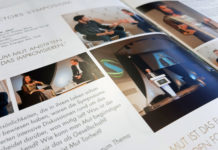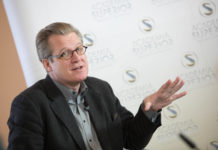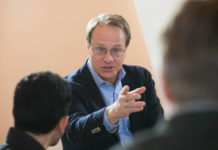I was born a refugee in Syria and then I had to flee again – a refugee twice over. I grew up in Yarmouk camp as a Palestinian in Syria. My father, who is blind and a musician, made me learn to play the piano and I took over his shop. It was a curious upbringing, in a camp that is really a city, as strangers in a strange land, between Arab and western classical music.
I studied and got married, building a future for us. But when the war came, famine and bombs started to kill people every day. The siege stopped all food and water from reaching us. People were desperate, fighting over a single cup of milk. My baby son lost half his body weight.
I had to make sure we had something to eat, and I found a few sacks of bird seed and began to fry falafel in the street and to sell it. A pianist who played Mozart and Beethoven, Tchaikovsky, Rachmaninov, I am shot down, sitting in the street frying falafel. That is when I decided to take my piano and move it into the street, into the rubble. I simply had to play for my community. A musician needs an audience, otherwise he dies. So, I played and kids around me formed a choir. At first people were curious, but after a while they got sick of my playing. It didn’t help. We were there, singing “we need water, we need water”, but we still didn’t have water.
„I PLAY THE PIANO to build a community.”
Was it courageous what I did? I did not think it was. I simply had to do it. Out in the street you can be killed, but otherwise you die of hunger, you die little by little. And I knew that I was also putting other people in danger with my playing. I risked my wife losing her husband, my sons his father. Once I was playing and a little girl was standing there, listening to me. A sniper killed her in front of my eyes. I will never be able to forget that moment.
When people in the west heard about the pianist in the ruins they celebrated my courage, but that was just their romantic, western mind. I am not a strong person, and I did not play to give people hope. I was playing to stay alive myself.
What people have made of my playing in the ruins was very ambivalent for us. A press photographer took a picture of me and it was published all over the world, the pianist in the green t‑shirt who gives people hope. But he did not care about the consequences for us. After the photo, we were targeted even more by snipers and by bombs. More people died. He did not take that picture to help us.
If you ask me what courage is and whether it can be learned, I can only answer as a musician. In music you need to have courage, to trust your instincts, to act in the moment, to improvise. But improvisation does not mean acting randomly or without a plan. Improvisation is 20 % freedom, and 80 % technique and experience. Only if you have this experience can you improvise in any given moment. You can be courageous only if you have an inner structure you can trust, if you have practiced and experience how to act. That is the secret of making music, but it is also the secret of being able to act in a given situation, having something inside you that you can rely on.
VITA
Despite the life-threatening situation under the IS regime, the Palestinian-Syrian refugee and pianist played the piano in the embattled Palestinian camp Yarmouk near Damascus. As “pianist in the rubble” he protested against violence, devastation and hunger, established a sense of community and gave people hope.
In spring 2015, due to the imposed ban on music, the Islamists burned his piano in front of his eyes. Since this incident, his life was under serious threat and Aeham Ahmad had to leave his family behind. He fled from Syria via Turkey, Greece, Serbia, Croatia and Austria and reached Germany in September 2015.
In October 2015 Aeham Ahmad gave his first concert for refugees and volunteers in Munich, followed by more than 200 concerts supporting the refugee relief and other charity concerts. However, due to an injury by a piece of shrapnel in his right hand, a career as classical concert pianist will most likely be impossible for him. In December 2015, Aeham Ahmad was awarded the International Beethoven Prize for Human Rights.






